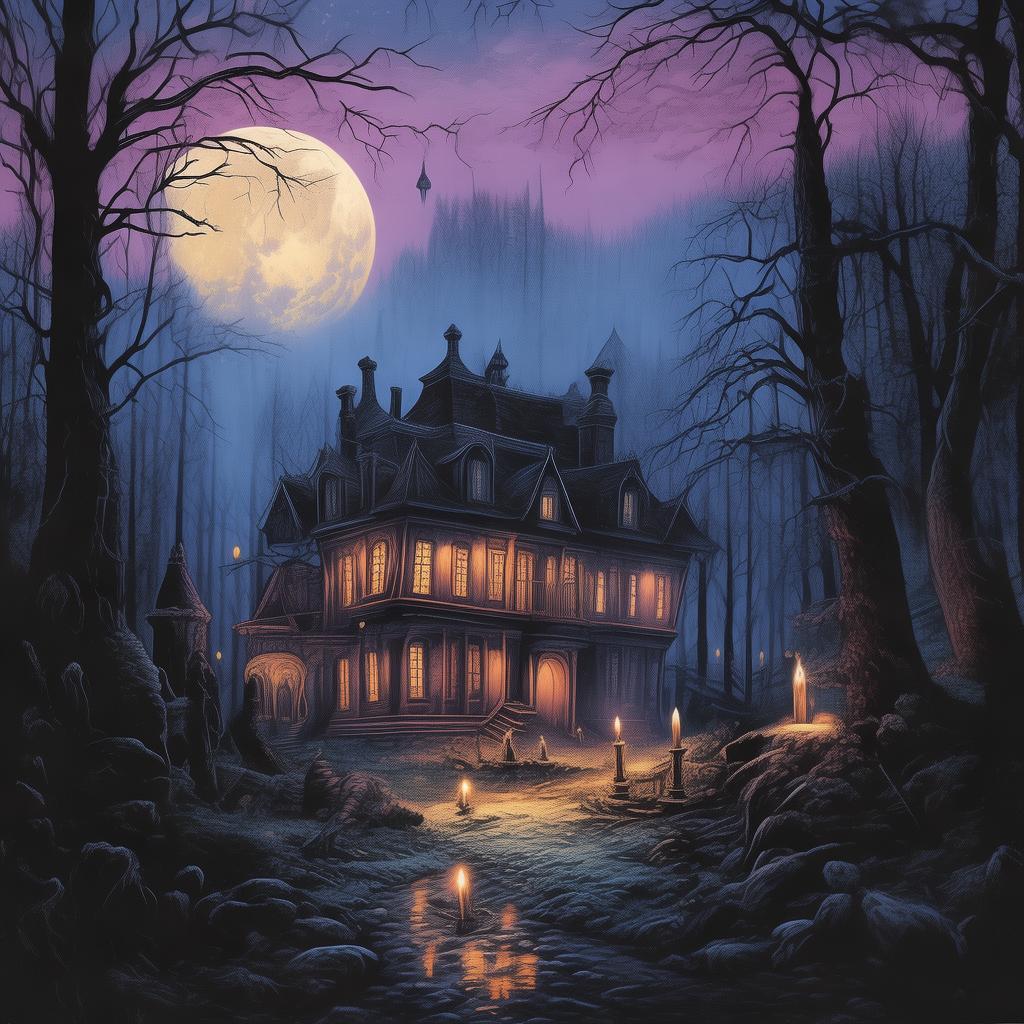The Lament of the Empty Streets
The sun dipped below the horizon, casting a melancholic glow over the once bustling streets of Zhang Zhen's Ghost-City. The city, now a shadow of its former self, had become a ghost town, its residents long since vanished. It was here, in this eerie expanse of abandoned buildings and silent streets, that young artist Liu Mei decided to set up her studio.
Liu Mei had always been drawn to the mysterious and the macabre. Her paintings, dark and brooding, often depicted scenes of desolation and loss. She had heard whispers of the city's haunted past, tales of restless spirits and eerie occurrences, but she saw it as an opportunity to immerse herself in her art and perhaps uncover something truly extraordinary.
The day she moved into the city, the air was thick with an unsettling silence. The wind howled through the empty streets, carrying with it the faint echoes of laughter and whispers that seemed to come from nowhere. Liu Mei's heart raced as she navigated the labyrinthine alleys, her flashlight casting flickering shadows on the walls.
Her studio was a small, dilapidated building at the edge of the city. The windows were broken, and the door creaked ominously with each step she took inside. She set up her easel in the corner, the only light coming from the single, flickering bulb that hung from the ceiling.
As the days passed, Liu Mei became more and more intrigued by the city's haunting legends. She began to notice strange occurrences that seemed to follow her wherever she went. At night, she would hear faint, ghostly whispers that seemed to come from the walls, and she often felt a cold breeze brush past her, leaving her shivering.

One evening, as she was painting, she heard a faint knocking at the door. Startled, she rushed to answer it, only to find the door locked from the inside. She turned back to the door, her heart pounding, and saw a shadowy figure standing at the window, peering in at her.
Liu Mei's breath caught in her throat. She could see the figure's eyes, wide and filled with sorrow. The figure raised a hand, as if to wave her away, and then vanished as quickly as it had appeared.
The next day, Liu Mei decided to explore the city further. She wandered through the abandoned buildings, her footsteps echoing in the silence. She found a small, dusty journal hidden behind a loose brick in one of the walls. The journal belonged to a woman named Liang Mei, who had lived in the city many years ago.
The journal chronicled Liang Mei's life, her love for a man named Zhang Zhen, and her eventual descent into madness. She had been accused of witchcraft and had been forced to flee the city, leaving behind her beloved Zhang Zhen. The journal spoke of her loneliness and despair, and of the spirits that had haunted her ever since.
Liu Mei realized that the whispers and cold breezes were the spirits of the city, the lingering presence of Liang Mei and Zhang Zhen. She decided to paint a portrait of Liang Mei, capturing the sorrow and loneliness that had driven her to madness.
As she worked on the painting, Liu Mei felt a strange connection to Liang Mei. She began to hear her voice in her head, whispering words of love and loss. Liu Mei's heart ached for the woman, and she knew that she had to help her.
She began to speak to the spirits, trying to reach out to them and offer them peace. The spirits seemed to respond, and the cold breezes and whispers grew less frequent. Liu Mei's painting became a beacon of hope, a way for the spirits to find solace in the afterlife.
One night, as Liu Mei was finishing her painting, she heard a soft, melodic tune playing in the distance. She followed the sound, and as she approached the source, she saw a figure standing at the edge of the city, playing a lute.
It was Zhang Zhen, the man who had loved Liang Mei so deeply. He looked up at Liu Mei, his eyes filled with gratitude. He had been waiting for someone to come along and help Liang Mei find peace.
Liu Mei nodded, and Zhang Zhen began to play a haunting melody, one that seemed to resonate with the spirits of the city. The spirits gathered around him, their sorrowful faces softened by the music.
As the melody played, the spirits of Liang Mei and Zhang Zhen seemed to merge, their spirits finally finding peace. Liu Mei watched as the city began to change, the abandoned buildings being restored to their former glory, and the streets once again filled with life.
Liu Mei's painting, "The Lament of the Empty Streets," became a symbol of hope and healing, a testament to the power of love and the enduring spirit of humanity. She knew that she had been chosen to help the spirits of Zhang Zhen's Ghost-City find peace, and she was honored to have been a part of their journey.
In the end, Liu Mei realized that the city was not just a place of haunted legends, but a place of love and loss, a place where spirits could find solace and humanity could find inspiration.
✨ Original Statement ✨
All articles published on this website (including but not limited to text, images, videos, and other content) are original or authorized for reposting and are protected by relevant laws. Without the explicit written permission of this website, no individual or organization may copy, modify, repost, or use the content for commercial purposes.
If you need to quote or cooperate, please contact this site for authorization. We reserve the right to pursue legal responsibility for any unauthorized use.
Hereby declared.









